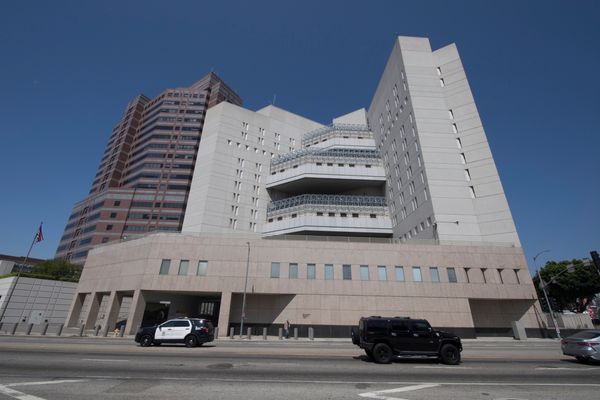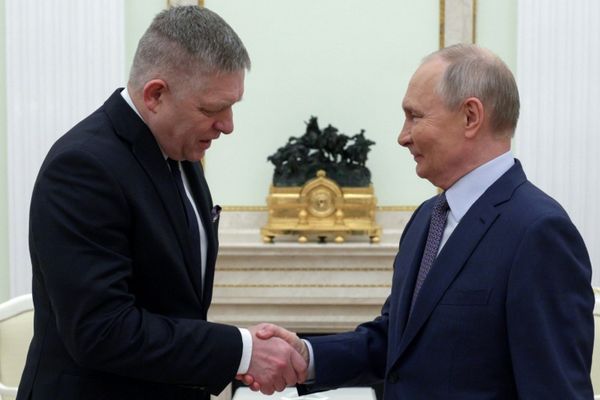
Hiroshima (Japan) (AFP) - Ukrainian President Volodymyr Zelensky is poised for a first post-invasion trip to the Asia-Pacific, meeting allies at a G7 summit in Hiroshima as the bloc hit Russia's "war machine" with further sanctions.
The previously unannounced visit was revealed by officials Friday -- a rare long-haul foray for the war-time president and an opportunity to huddle with leaders of seven wealthy democracies that bankroll his country's defence.
Those leaders also provided Kyiv with key breakthroughs, as they agreed new sanctions against Russia and US President Joe Biden said Washington will support providing advanced warplanes, including F-16 fighter jets, to Ukraine.
Zelensky hailed the move as "historic", adding that he looked forward to "discussing the practical implementation".
His Japanese visit comes at a pivotal time in the 15-month-old conflict, as Ukranian troops push back against Russian gains and ready a long-awaited spring offensive.
Top Zelensky security aide Oleksii Danilov said the Ukrainian leader would go "wherever the country needs him, in any part of the world", including Hiroshima, a city synonymous with the horrors of war.
"Very important things will be decided there, and therefore the presence, the physical presence of our president is absolutely essential to defend our interests," Danilov said.
The trip will also give Zelensky an opportunity to win over powerful unaligned nations joining the summit, including Brazil and India.
In another charm offensive, on Friday he arrived on an unannounced visit to Jeddah to address Arab League leaders gathered in the Saudi Arabian city.
The Ukrainian leader had recently undertaken a European tour, reiterating pleas to allies for more military support and tougher sanctions on Russia.
'Diamonds are not forever'
"There are a host of things that Ukraine will continue to need, from artillery shells to sophisticated air defence systems," said Ian Lesser of the German Marshall Fund foreign policy think tank.
Touching on US F-16s, he said there are "very large numbers in Europe that could be sent to Ukraine".
G7 leaders agreed new sanctions on Friday that they said would "starve Russia of G7 technology, industrial equipment and services that support its war machine".
A bloc statement also pledged to "restrict trade in and use of diamonds mined, processed or produced in Russia."
The trade is estimated to be worth about $4-5 billion a year for Russia.
"Russian diamonds are not forever," said EU Council President Charles Michel.
EU member state Belgium is among the largest wholesale buyers of Russian diamonds, along with India and the United Arab Emirates. The United States is a major end-market for the finished product.
The G7 also said they would step up efforts to prevent circumvention of their existing sanctions regime, "including targeting entities transporting material to the front".
The group held talks Friday evening on nuclear disarmament and warned of Beijing's rapidly growing nuclear weapons stockpile.
"China's accelerating build-up of its nuclear arsenal without transparency nor meaningful dialogue poses a concern to global and regional stability," they said in a statement that also condemned Russia's "irresponsible nuclear rhetoric".
US sanctions
Earlier Friday, the United States and other members announced their own new sanctions on Russia, with a senior US administration official saying another 70 entities from Russia and "other countries" would be placed on a US blacklist.
"There will be upwards of 300 new sanctions against individuals, entities, vessels and aircraft," the official said.
London, meanwhile, took aim at Russian copper, aluminium and nickel -- as well as diamonds.
Moscow's invasion of Ukraine has prompted waves of sanctions that have helped plunge Russia into recession and drained the Kremlin's war chest.
The Russian economy contracted 2.1 percent in 2022, a trend that continued early this year.
But Moscow has adapted quickly, introducing strict capital controls, diverting trade to allies like China and reportedly borrowing evasion techniques from much-sanctioned countries like Cuba, Iran and North Korea.
The International Monetary Fund has projected a modest 0.7 percent economic rebound in 2023.
G7 leaders began the day visiting Hiroshima's peace park memorials and museum, where they saw evidence of the suffering and devastation caused by the 1945 atomic bombing of the city.
In a moment heavy with symbolism, they laid wreaths at the Hiroshima cenotaph, which commemorates the estimated 140,000 people killed in the attack and its aftermath.







